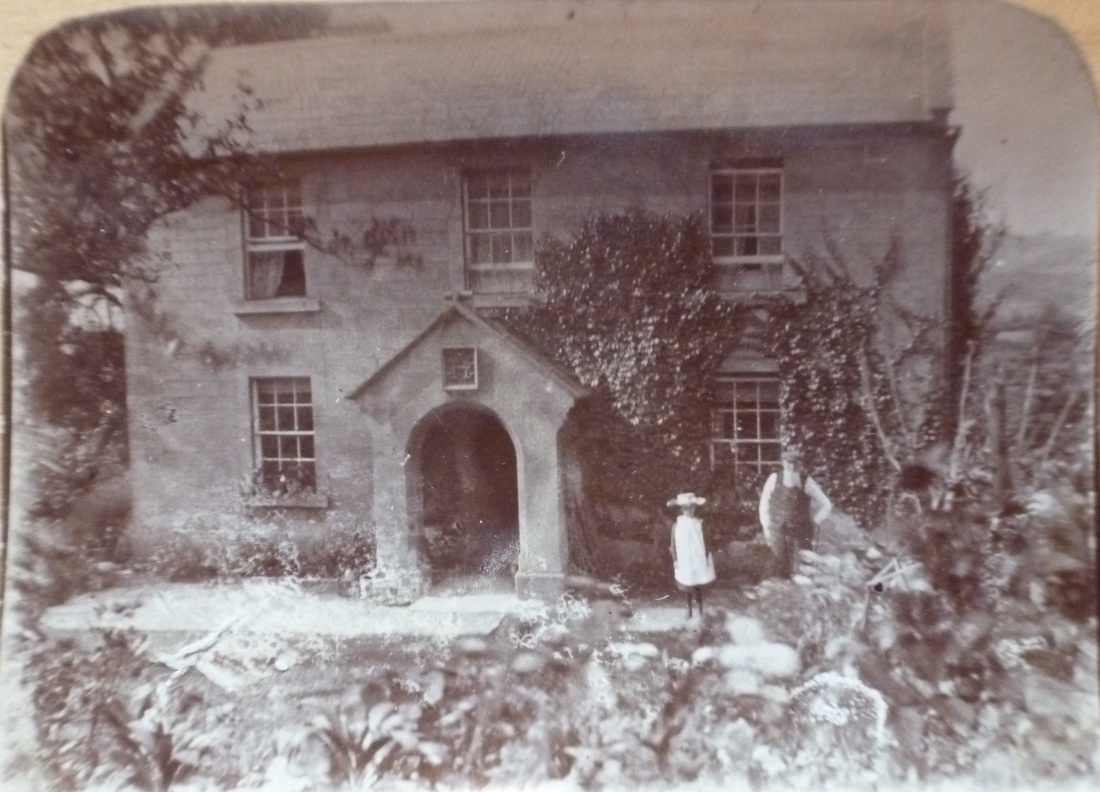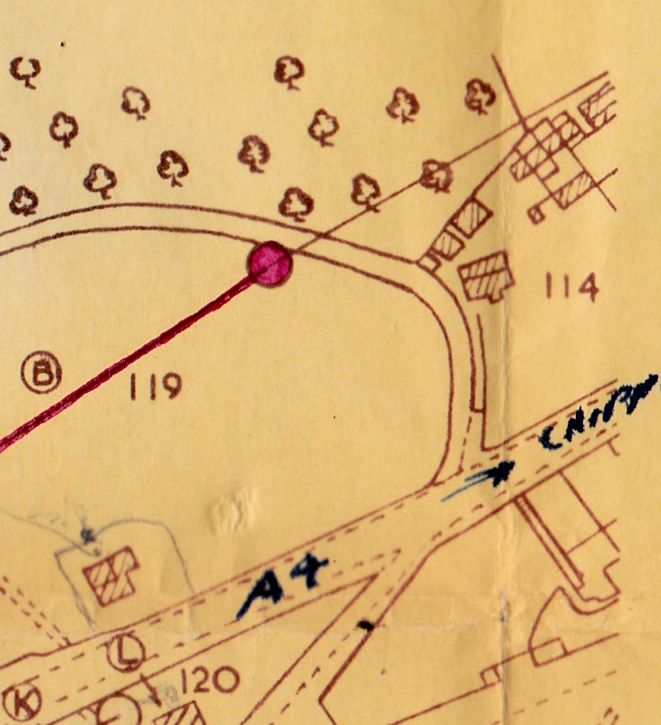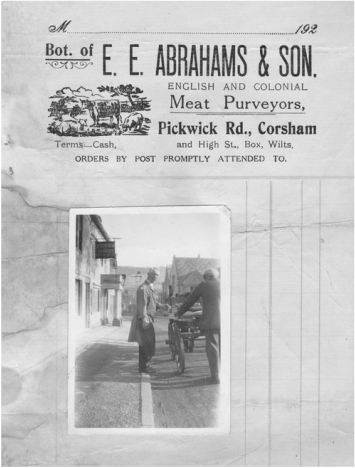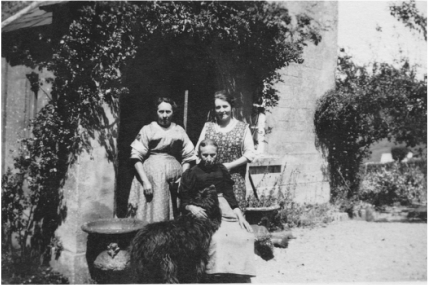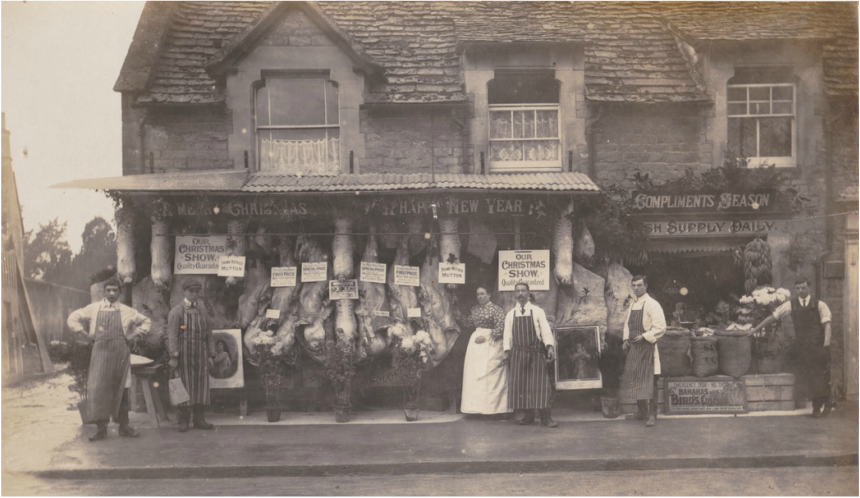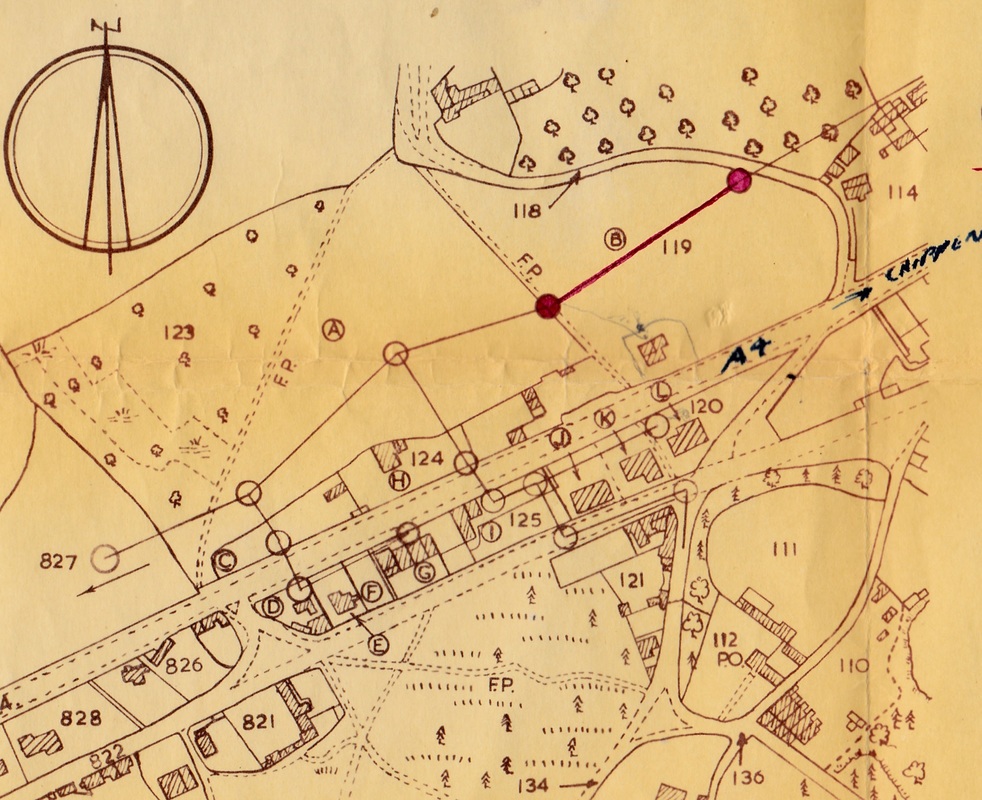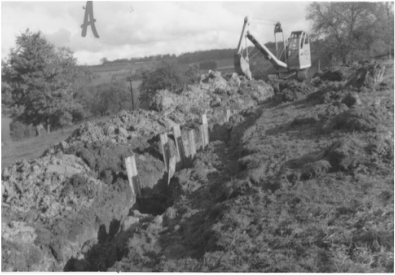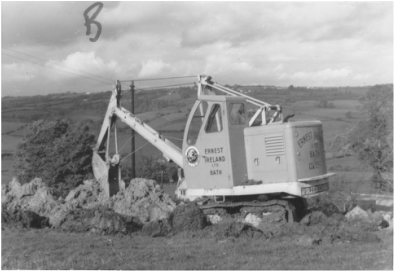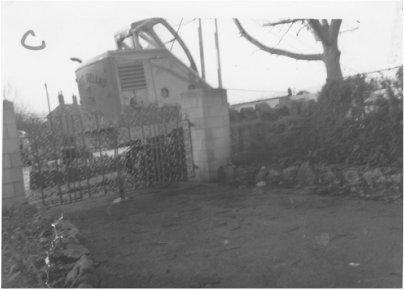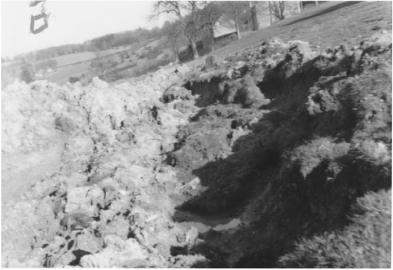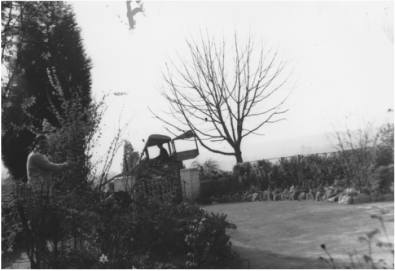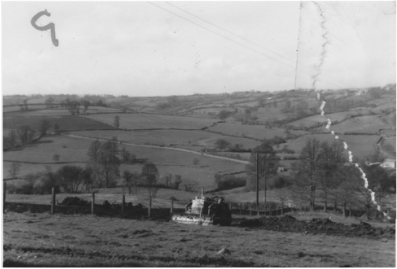|
Brookwell:
"The House Went Bang in the Night" Eric Callaway April 2016 Documents and trench photos courtesy Eric Callaway Brookwell is now a vacant plot going up Box Hill on the left. It had a number of notable local residents including the Cogswell and Abrahams family. This is the strange story of the death of the house and why it was pulled down. Left: Brookwell courtesy Eric Callawy |
|
Butcher's Shop
My Abrahams great grandparents lived there in 1911, Ernest Edward Abrahams and his wife Frances, with their sons Edward Bodin and Francis George Abrahams, and their grandson (my father) Ernest Edward (Eddie) Callaway. It was Eddie who recorded most of the information in this article. The Abrahams family had moved into the house after the death of railwayman Mark Cogswell in 1905. My great grandparents used the property (marked as 114 on the map right) as a home and as part of their butcher's business. It was ideal, convenient to the A4 road but off the track giving some privacy for the slaughterhouse they built there in the sheds behind the house. Right: Map dated 1959 showing the butcher's slaughterhouse at the site of the buildings just above reference number 114 |
Abrahams Butchers
It was a tough business in the 1920s when money was tight and, whilst my great grandparents tried to trade throughout Box village, they decided that they would only sell for cash, no credit given.
It was a tough business in the 1920s when money was tight and, whilst my great grandparents tried to trade throughout Box village, they decided that they would only sell for cash, no credit given.
|
They expanded by acquiring other shops in Corsham, Box, Atworth and Colerne. The photograph left shows my great grandfather Abrahams loading meat outside their shop next to the Queen's Head, Box.
Seen below at Brookwell: Frances Abrahams (my great grandmother) left; Rhoda Evans (my great great grandmother) front; and Rhoda (Daisy) Callaway (my grandmother) right. |
The photo below shows various members of the family outside their shop at Pickwick Road, Corsham (now demolished) including my great grandparents Abrahams wearing smocks in the centre of the picture and my father Eddie on the right.
|
After the death of my great grandparents, my family stayed in the area and built the house, Dorma, shown at 119 on the map above. Next door an elderly couple, Walter Stanley Loader and his wife, later bought Brookwell in 1950.
All seemed to be well until 1960 when the Calne and Chippenham Rural District Council sent a notice that they intended to install a public sewer through the land at Dorma which would run through the area of Quarre Close and behind the Brookwell property. It was intended to run along the red line marked on the District Council Surveyor's map shown right. But the worst possible outcome arose. |
On 9 November 1960 the Loaders were wakened with a terrific bang and thud and the house was subject to an Almighty Shake. Mr Loader went downstairs to investigate with a torch and found pipes had come away from the wall. Whilst they waited to see find out how the property would settle down there were four months of heavy rainfall. and they saw cracks developing on the walls.
The home they had bought for £3,400 in 1950 and lived in for 10 years was declared to be in danger of collapsing, too expensive to mend and cannot be sold. The Loaders asked for compensation which was denied by both the council and the contractors and so, aged 76, Mr Loader brought a legal case against them asking for compensation of £7,000 which was heard in the Bristol Assize Court in February 1968.
The home they had bought for £3,400 in 1950 and lived in for 10 years was declared to be in danger of collapsing, too expensive to mend and cannot be sold. The Loaders asked for compensation which was denied by both the council and the contractors and so, aged 76, Mr Loader brought a legal case against them asking for compensation of £7,000 which was heard in the Bristol Assize Court in February 1968.
The Court Case
The defendants claimed that Brookwell had always been subject to subsidence, considerable movement - several movements over many years. They maintained that they had completed their work promptly, filling in the trenches immediately after digging and laying the pipe. They produced witnesses to say that the trench they had dug was too far away from Brookwell to have affected that house.
But their case fell apart when Eddie Callaway was asked to give evidence as a witness. Eddie disagreed that the trenches were filled in promptly and blurted out, You're a Liar and I Can Prove It. Admonished by the judge, Eddie was asked to produce his evidence for such strong language, the case was halted and Eddie came back with the following details of events.
The defendants claimed that Brookwell had always been subject to subsidence, considerable movement - several movements over many years. They maintained that they had completed their work promptly, filling in the trenches immediately after digging and laying the pipe. They produced witnesses to say that the trench they had dug was too far away from Brookwell to have affected that house.
But their case fell apart when Eddie Callaway was asked to give evidence as a witness. Eddie disagreed that the trenches were filled in promptly and blurted out, You're a Liar and I Can Prove It. Admonished by the judge, Eddie was asked to produce his evidence for such strong language, the case was halted and Eddie came back with the following details of events.
Eddie Callaway's Report
From the outset, my father was concerned about the standard of work by the contractors Ernest Ireland (Contractors) Ltd and he made notes of the work over several month. You can see from the photos below the size of the equipment needed to cut such a deep trench.
The work started on 17 October 1960 but was a problem from the start when there was damage to the front drive of Dorma by bulldozer tracks. He reported the problem to the foreman of the work, Mr Knapp. There was further damage done on 23 November at 10.30am.
From the outset, my father was concerned about the standard of work by the contractors Ernest Ireland (Contractors) Ltd and he made notes of the work over several month. You can see from the photos below the size of the equipment needed to cut such a deep trench.
The work started on 17 October 1960 but was a problem from the start when there was damage to the front drive of Dorma by bulldozer tracks. He reported the problem to the foreman of the work, Mr Knapp. There was further damage done on 23 November at 10.30am.
After this there followed a series of delays and bad weather.
|
On 25 November Eddie was told that the trench would be completed and filled in but this didn't happen. The bulldozer came on site on 21 December but was removed after just two hours. On 17 January 1961 it had returned and started levelling the soil but the dumper truck got stuck on the ground and the contractors parked up their equipment and abandoned work (left).
A month later they returned and started infilling with top soil to replace the badly damaged ground which had been affected by the digging and caterpiller tracks. They intended to level the area with soil suitable for re-seeding. |
But again there were delays and the topsoil wasn't unloaded until 8 March (below) when they still had to clear the clay undersoil and replace with better quality.
Finally on 11 March 1961 the work was finished and the site cleared of equipment.
The Verdict
The defence fell apart. Further evidence was produced that the contractors had written to the council complaining about the shocking conditions ... owing to the unexpected nature of the ground which is semi-liquid. They advised that the sides of the trenches needed timbering.
The judge found for the plaintiff and awarded the Loaders compensation of £4,400 and costs. He said that the sides of the trenches should have been shored up with concrete not mud. The sewer had come within 63 feet of Brookwell and had activated a rotational slip where there was a strata of limestone permeable to rainfall over clay and marl. Like the Rising Sun site close by, Brookwell has never been built on again.
The defence fell apart. Further evidence was produced that the contractors had written to the council complaining about the shocking conditions ... owing to the unexpected nature of the ground which is semi-liquid. They advised that the sides of the trenches needed timbering.
The judge found for the plaintiff and awarded the Loaders compensation of £4,400 and costs. He said that the sides of the trenches should have been shored up with concrete not mud. The sewer had come within 63 feet of Brookwell and had activated a rotational slip where there was a strata of limestone permeable to rainfall over clay and marl. Like the Rising Sun site close by, Brookwell has never been built on again.
